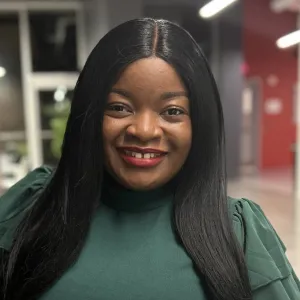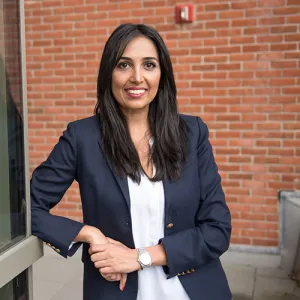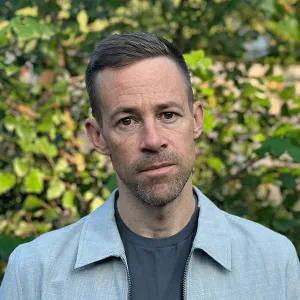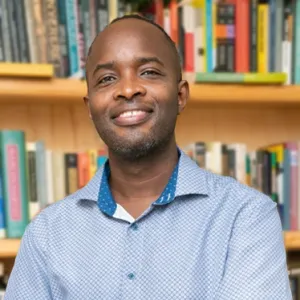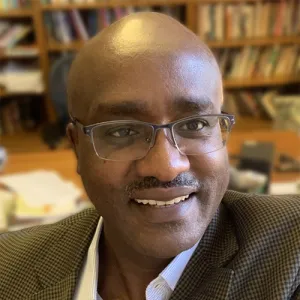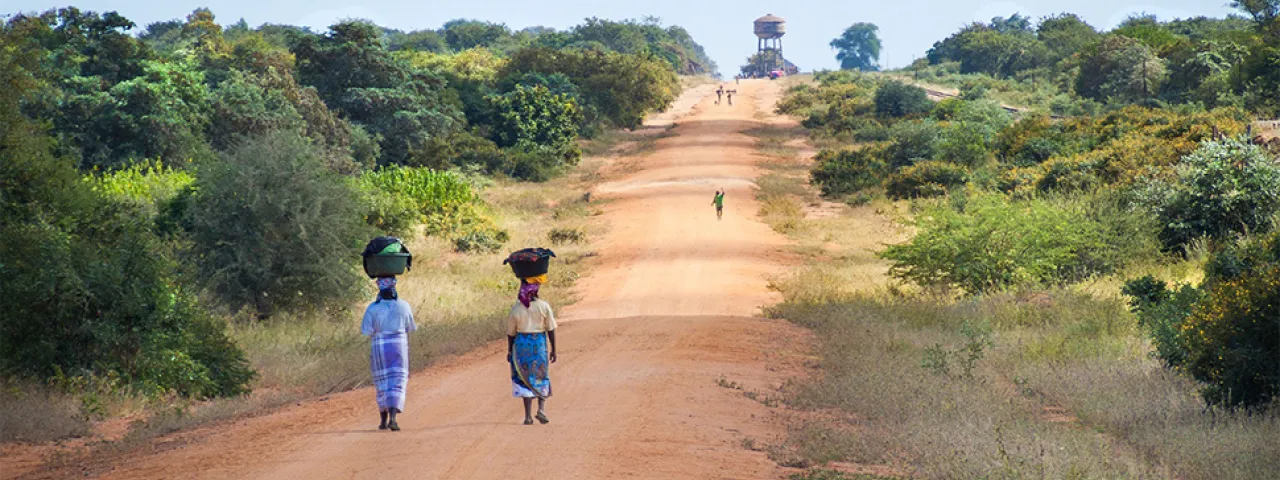
African Studies
The Program in African Studies provides a systematic introduction to the complex historical, political and social issues of the African continent. Its major and minor are structured to give students interdisciplinary training within key fields of knowledge: literature and the arts, social science and historical studies.
Requirements & Courses
African Studies Major
Requirements
Ten Courses
- General requirements (five courses):
- One course from the arts, literature, and humanities
- One course from history
- One course from social sciences
- Two courses focused on the African diaspora
- Electives: Four courses in an area of emphasis designed in consultation with the student’s adviser. Areas of major emphasis include, but are not limited to, history, religion, literature, politics, gender and sexuality, or culture. No more than three electives can be from the same department.
- Capstone: One 300-level seminar, AFS 400, or honors thesis taught by a member of the African studies program.
Major Requirement Details
- Students with intermediate-level competency in an African language may petition for this to count for one of their electives. Students are encouraged to consult the African language offerings in relevant study abroad programs and the Five Colleges Center for World Languages (FCCWL). Any language course that counts for the major should normally be the equivalent of a full four-credit course. It is possible to combine two 2-credit FCCWL courses to meet the 4-credit requirement. Language-acquisition courses in colonial languages (e.g. French, German, and Portuguese) are not eligible.
- Students with a second major can only count three courses from that major toward the AFS major.
- No more than one course taken S/U may count toward the major.
- Six courses in the major should be taken at Smith.
African Studies Minor
Requirements
Six semester courses on Africa
- One course from arts, literature, and humanities
- One course from historical studies
- One course from the social sciences
- Three electives
Minor Requirement Details
- No more than two courses from a student’s major may be counted toward the minor.
- Equivalent courses at other colleges may be substituted for Five College courses, with permission of the minor adviser.
- Students interested in African studies are encouraged to study French, Portuguese, or an African language.
- Intermediate-level competence in an African language may count as one of the required courses in the field of arts, literature, and humanities, with permission of the minor adviser.
Courses
AFS 113 Themes in African Studies (1 Credit)
This course asks the question of what it means to study Africa. As the world’s second largest and most linguistically and culturally diverse continent, Africa is also one of the world’s least understood historically, politically, socially and culturally. This course thus aims to challenge conventional representations of the continent. In doing so, it also aims to introduce students to the broader interdisciplinary and multidisciplinary study of the continent. S/U only.
Fall
AFS 214 Introduction to Human Rights in Africa (4 Credits)
This course provides an introduction to understanding the concept and practice of human rights in Africa, including comprehending the historical context of these issues. In this regard, several questions are addressed including: What are human rights? Within the African context, are human rights universal or relative? Are human rights viewed as individual or collective in Africa? What is the international framework that affects the enforcement of human rights in Africa? What are the regional and national regimes for safeguarding human rights in Africa? What are some current human rights issues in Africa? Enrollment limited to 40. (E) Social Science
Fall, Spring, Alternate Years
AFS 215 Colloquium: Women and the Law in Africa (4 Credits)
This course focuses on historical, current, and emerging issues centering women and the law in Africa. It analyzes key incidents in African law to identify areas of commonalities and tension in the discourse surrounding the rights of women, the construction of gender, gender(ed) norms, sexuality/sexualities, and the negotiation of intimate relationships. The course asks: To what extent has the law in Africa safeguarded the rights of women and girls? What role does gender and sexuality play in African law? How are activists and lawyers utilizing the law to fight against gender-based violence? What are the shifting boundaries of African feminist jurisprudence? (E) Social Science
Fall, Spring, Alternate Years
AFS 216 Colloquium: Sex & Societal Norms in Africa (4 Credits)
This course examines the mores, rules, and regulations that presently exists in African societies with regards to sex, sexual activity, and sexualities. Using an intersectional, decolonial, African, feminist perspective, it examines the social justification behind the establishment of such rules. Are these rules and norms instituted to safeguard vulnerable populations or are they based on the subjugation of entire classes of persons? Enrollment limited to 18. (E) Social Science
Fall, Spring, Alternate Years
AFS 222 Colloquium: Popular Culture, Gender and Sexuality in Africa (4 Credits)
This course uses popular culture as a tool to analyze gender and sexuality issues in Africa. It discusses relevant issues in gender and sexuality across the continent, using selected African songs and movies, which feature these issues as centralized themes. It also examines the lived experiences of African actors, musicians and artistes, both historical and modern, as a means of discussing social norms on gender and sexuality and their subversion. Enrollment limited to 18. (E) Social Science
Fall, Spring, Variable
AFS 400 Special Studies (1-4 Credits)
Instructor permission required.
Fall, Spring
AFS 430D Honors Thesis (4 Credits)
Department permission required.
Fall, Spring
Crosslisted Courses
AFR 202aa Colloquium: Topics in Africana Studies-Anthropology and the African Diaspora (4 Credits)
The African continent’s place as the cradle of humanity has made it central to Anthropology. However, Anthropology’s imperial origins have long put it at odds with the people of the African Diaspora. This course examines the complexities of the relationship between Anthropology and the African Diaspora. The course explores the African Diaspora as space, place, and identity; critically examines Anthropology’s history; explores the discipline’s core theories and thinkers; broadens students' thinking of the discipline’s canon; and examines key ethnographies of and from the African diaspora. Restrictions: AFR 202 may be taken for credit a total of three times with a different topic. Enrollment limited to 20. Social Science
Fall, Spring, Variable
AFR 210 Colloquium: Black Political Economy-From Slavery to Reparatory Justice (4 Credits)
What constitutes the field of study called Black Political Economy? This course excavates a radical tradition of political economy in African diaspora studies, a tradition which has sheltered some of the most thoroughgoingly insightful perspectives on Black oppression in the Americas over the last 500 years. The course takes a wide-ranging and interdisciplinary approach which draws on several fields, including Africana intellectual history, political economy, sociological studies and cultural studies in its presentation of the field of study termed Black political economy. Enrollment limited to 18. Social Science; Historical Studies
Fall, Spring, Variable
AFR 345 Seminar: Classic Black Texts (4 Credits)
This course looks closely at a series of canonical black texts. The intention is to examine these texts in their specific historical context with careful attention to their place within Africana intellectual history. This course either focuses on a series of intensive investigations of a set of major texts within Africana studies, or it operates thematically. A thematic treatment of the course involves taking one leading critical figure within the field – for example Frantz Fanon, Toni Morrison, Aimé Césaire, Paule Marshall or Kamau Brathwaite – and constructing the course around a reflection on their work and influence on the field of Africana studies. Restrictions: Juniors and seniors only. Enrollment limited to 15. Instructor permission required. Social Science; Historical Studies; Literature
Fall, Spring, Annually
ANT 229 Africa and the Environment (4 Credits)
In Western discourses, African environments are defined by violence, famine and degradation. These characteristics are depicted as symptoms of an African resistance to Western values such as private property, democracy and environmentalism. This course encourages students to think critically about such portrayals by learning about specific environments in Africa and how humans have interacted with them across time. The syllabus is anchored in cultural anthropology, but includes units on human evolution, the origins and spread of pastoralism, the history of colonial conservation science and more. Discussions covered include gender, race, land grabbing, indigenous knowledge, the commons, the cattle complex, desertification, oil, dams and nationalism. Natural Science; Social Science; Historical Studies
Fall, Spring, Variable
ANT 257 Urban Anthropology (4 Credits)
This course considers the city as both a setting for anthropological research and as an ethnographic object of study in itself. The class aims to think critically about the theoretical and methodological possibilities, challenges and limitations that are posed by urban anthropology. Students consider concepts and themes such as urbanization and migration; urban space and mobility; gender, race and ethnicity; technology and virtual space; markets and economies; citizenship and belonging; and production and consumption. Enrollment limited to 40. Social Science
Fall, Spring, Alternate Years
ENG 241 The Empire Writes Back: Postcolonial Literature (4 Credits)
Introduction to Anglophone fiction, poetry, drama and memoir from Africa, the Caribbean and South Asia in the aftermath of the British empire. Concerns include the cultural and political work of literature in response to histories of colonial and racial dominance; writers' ambivalence towards English linguistic, literary and cultural legacies; ways literature can (re)construct national identities and histories and address dominant notions of race, class, gender and sexuality; women writers' distinctiveness and modes of contesting patriarchal and colonial ideologies; and global diasporas, migration, globalization and U.S. imperialism. Readings include Achebe, Adichie, Aidoo, Dangarembga, Walcott, Cliff, Rushdie, Ghosh, Lahiri, Hamid and others. Literature
Fall, Spring, Variable
ENG 277 Postcolonial Women Writers (4 Credits)
A study of 20th-21st century women writers in English from Africa, South Asia and the Caribbean. Students read a variety of genres in their historical, cultural and political contexts, to address questions such as: how have women writers addressed the challenges of contesting sexism and patriarchy from within their home cultures as well as the impacts of western imperialism? How have they combined feminism with anti-colonialism, and addressed issues of race, class, gender, sexuality or nationhood, war, migration and diaspora? How have they deployed the act of writing as cultural work? Writers include Adichie, Aidoo, Cliff, Desai, Emecheta, Hosain, Kincaid, Satrapi and Zadie Smith. Prerequisite: one WI course. Literature
Fall, Spring, Variable
ENV 326 Seminar: Environmental Justice and Natural Resource Management (4 Credits)
This course examines the connections between natural resource management and environmental justice in the US and the Global South. The class studies the benefits and limits of traditional top-down approaches to the management of forests, land, fisheries, biodiversity, underground resources, water, food and genomes in different parts of the world. By discussing case studies of environmental justice issues from tar sands mining in Alberta to the impact of biofuels and GMOs on local populations in Mexico, students question and rethink the management of natural resources. Restrictions: Juniors and seniors only. Enrollment limited to 12. Instructor permission required. Social Science
Fall, Spring, Annually
FRN 230ww Colloquium: Topics in French Studies-Women Writers of Africa and the Caribbean (4 Credits)
An introduction to works by contemporary women writers from Francophone Africa and the Caribbean. Topics studied include colonialism, exile, motherhood and intersections between class and gender. The study of these works and of the French language is informed by attention to the historical, political and cultural circumstances of writing as a woman in a former French colony. Texts include works by Mariama Bâ, Maryse Condé, Yamina Benguigui and Marie-Célie Agnant. Basis for the major. Prerequisite: FRN 220. Restrictions: FRN 230 may not be repeated. Enrollment limited to 18. Course taught in French. WI Foreign Language; Literature
Fall, Spring, Variable
FRN 252cl Topics in French Cinema-Cities of Light: Urban Spaces in Francophone Film (4 Credits)
From Paris to Fort-de-France, Montreal to Dakar, this class studies how various filmmakers from the Francophone world present urban spaces as sites of conflict, solidarity, alienation and self-discovery. How do these portraits confirm or challenge the distinction between urban and non-urban? How does the image of the city shift for “insiders” and “outsiders”? Other topics to be discussed include immigration, colonialism and globalization. Works by Sembène Ousmane, Denys Arcand, Mweze Ngangura and Euzhan Palcy. Course taught in French. Arts; Foreign Language; Literature
Fall, Spring, Variable
FRN 262 After Algeria: Revolution, Republic and Race in Modern France (4 Credits)
From the colonial conquest in the early 19th century through independence in 1962, Algeria has evoked passions on both sides of the Mediterranean Sea, passions frequently resulting in violence that has not entirely subsided. Through a variety of perspectives and readings, this class explores a post-Algerian French society that appears to be permanently marked by its Algerian experience. To what extent has the experience in and of Algeria transformed contemporary French culture? In what ways can one speak of the Algerian experience in revolutionary terms? Prerequisite: FRN 230, or equivalent. Course taught in French. Foreign Language; Social Science; Literature
Fall, Spring, Variable
FRN 380tw Topics in French Cultural Studies- Travel Writing and Self-Discovery (4 Credits)
A survey of Francophone travel writing from the 16th to the 21st centuries. Students are exposed to a literary form that achieved popularity and cultural prestige early on, was then significantly challenged and diversified, and is presently enjoying a resurgence. The class considers fictional and nonfictional accounts reflecting different geographies of travel and migration. While early voyagers tended to assert the relative superiority of French culture, subsequent generations of travelers abandoned discovery for self-discovery and critiqued colonialism instead of indigenous cultures. Countries and regions surveyed include Palestine, Turkey, Spain, Morocco, Algeria, Central and West Africa, the United States, Iran, France, Indonesia and Thailand. Course taught in French. Restrictions: FRN 380 may be repeated once with a different topic. Foreign Language; Literature
Fall, Spring, Variable
FYS 112 #FlipTheScript: Hot Topics in African Feminism(s) Today (4 Credits)
Does affirmative action in politics improve human rights conditions for African women or lead to tokenism? Are the decisions of religious African feminists to submit to their husbands or wear head coverings, choices that display female agency or choices steeped in oppression? This course considers some of the most controversial and hotly debated topics relevant to feminism in Africa today. In doing so, it aims to teach students how to identify both the core issues and points of divergence underpinning these debates and to be able to analyze and articulate their own positions on controversial issues. Restrictions: First-years only; students are limited to one first-year seminar. Enrollment limited to 16. (E) WI Social Science
Fall, Spring, Variable
FYS 165 Childhood in African Literature (4 Credits)
A study of the theme of childhood in modern African literature. The course explores how representations of childhood in African literature are tied to gendered social, political and cultural histories; and to questions of self and of national identity. Discussions are informed by several questions: How do African narratives of childhood help to understand the shifting historical, political and cultural landscapes in contemporary Africa? How does the enforced acquisition of colonial languages and cultures affect children as they attempt to master the codes of alien tongues and cultures? How do narratives told from the point of view of children represent and deal with such complex issues? What are the relationships between childhood narratives and autobiographies? Restrictions: First years only; students are limited to one first-year seminar. Enrollment limited to 16. WI Literature
Fall, Spring, Variable
GOV 227 Contemporary African Politics (4 Credits)
This survey course examines the ever-changing political and economic landscape of the African continent. The course aims to provide students with an understanding of the unique historical, economic and social variables that shape modern African politics, and introduces students to various theoretical and analytical approaches to the study of Africa’s political development. Central themes include the ongoing processes of nation-building and democratization, the constitutional question, the international relations of Africa, issues of peace and security, and Africa’s political economy. Designation: Comparative. Enrollment limited to 35. Social Science
Fall, Spring, Variable
GOV 233 Problems in Political Development (4 Credits)
This course explores the practical meaning of the term "development" and its impact on a range of global topics from the problems of poverty and income inequality to the spread of democracy, environmental degradation, urbanization, and gender empowerment. The course examines existing theories of economic development and considers how state governments, international donors, and NGOs interact to craft development policy. Designation: Comparative. Social Science
Fall, Spring, Variable
GOV 242 International Political Economy (4 Credits)
This course begins with an examination of the broad theoretical paradigms in international political economy (IPE), including the liberal, economic nationalist, structuralist and Marxist perspectives. The course analyzes critical debates in the post-World War II period, including the role of the Bretton Woods institutions (World Bank group and IMF), international trade and development, the debt question, poverty and global inequality, and the broad question of "globalization." Designation: International Relations. Prerequisite: GOV 241 or equivalent. First-year students may enroll only if they have completed GOV 241. Enrollment limited to 40. Social Science
Fall, Spring, Annually
GOV 247 International Relations in Africa (4 Credits)
This course provides an introduction to the international relations of contemporary Africa. It explores how Africa has redefined our understanding of international relations and its role as a global actor. Core themes include the politics of post-independence international alignments, the external causes and effects of authoritarian rule, and the continent's role in the global political economy. The course concludes with a consideration of pressing current issues on the African continent, including state failure, health interventions, issues of peace and security, and China’s growing economic and political influence. Designation: International Relations. Social Science
Fall, Spring, Variable
GOV 257 Colloquium: Refugee Politics (4 Credits)
This course examines refugees--i.e., people displaced within their country, to another country or, perhaps, somewhere "in between." Refugee politics prompt a consideration of the cause of refugee movements; persecution, flight, asylum and resettlement dynamics; the international response to humanitarian crises; and the "position" of refugees in the international system. In addition to international relations theory, the seminar focuses on historical studies, international law, comparative politics, refugee policy studies and anthropological approaches to displacement and "foreignness." Although special attention is devoted to the Middle East, other cases of refugee politics are examined. Designation: International Relations. Enrollment limited to 20. Social Science
Fall, Spring, Alternate Years
GOV 347cm Seminar: Topics in International and Comparative Politics-Climate Migration (4 Credits)
Humans have long migrated in response to environmental change, but in recent decades (in the context of climate change), “climate migration” has become the focus of intense ideological, normative and empirical debates. This seminar approaches these debates, how they have evolved, and what is at stake. The course treats the implications for various policy domains and issue areas – e.g., border control, refugee reception, adaptation to climate change already in the pipeline, reparations, constructions of ideological whiteness, future scenario-building and apocalypticism. The course focuses primarily on social science analyses, but also engages novels and feature and documentary films. Restrictions: Juniors and seniors only. Enrollment limited to 12. Instructor permission required. Social Science
Fall, Spring, Variable
GOV 347cr Seminar: Topics in International and Comparative Politics-Comparative Regionalization (4 Credits)
This course investigates the role of international organizations as global actors and their involvement in the domestic politics of, and beyond, their member states. Areas of intervention include efforts in democracy promotion, economic development, peace and security, and regional integration. This course moves beyond the focus on the traditional, Western actors, like the United Nations and European Union, and incorporates the processes undertaken by the African Union, the Association of Southeast Asian Nations, Organization of American States, among others. The goal of this course is to understand how these continental and regional organizations navigate the complexities of international and domestic politics. Restrictions: Juniors and seniors only. Enrollment limited to 12. Instructor permission required. Social Science
Fall, Spring, Variable
HST 135 Independent Africa: A Social and Cultural History (4 Credits)
This course provides a general, introductory survey of African social and cultural history from approximately the end of World War II to the present. In doing so, the course will look beyond the formal political maneuvering of elite figures, focusing instead on the many and competing ways in which a broad array of African actors engaged the changing political and social contexts in which they lived. As such, key themes of the course such as anticolonialism, decolonization, development, and HIV/AIDS will serve as lenses into a range of perspectives on life in an independent Africa. Enrollment limited to 40. Social Science; Historical Studies
Fall, Spring, Alternate Years
HST 157 Africa and the Making of the Modern World (4 Credits)
Often seen as peripheral to the modern world, Africa and African peoples are often ignored in both popular and scholarly world histories traversing the last several centuries. This course aims to turn these narratives on their head by not only injecting African histories into world historical narratives, but by using these histories to detail Africa’s centrality to understanding the world. In doing so, the course examines the development of and African experiences with the varying forms of capitalism and trade that developed out of both the Atlantic and Indian Ocean trade networks, the genealogical roots of European imperialism and the ways in which African peoples navigated, resisted and transformed these broader global phenomena in the construction of the world around them. This course is open to all students and assumes no prior knowledge. Enrollment limited to 40. Social Science; Historical Studies
Fall, Spring, Variable
HST 158 Modern Africa (4 Credits)
This course provides an introductory survey of African history from the nineteenth century to approximately World War II. In doing so, it provides a political, social, and economic history of the continent framed around the experiences of the continent’s peoples. Throughout the course, students ask the structural questions of what role slavery, abolition, colonialism, global industrialization, and capitalism played in shaping the continent’s past. Much more importantly, though, the course aims to focus the discussions on how African peoples understood, negotiated, and contested these structural phenomena in their daily lives—politically, socially, culturally, and spiritually. Enrollment limited to 40. Social Science; Historical Studies
Fall, Spring, Alternate Years
HST 234 Colloquium: Global Africa (4 Credits)
This course interrogates how scholars have engaged the "transnational" and "global" in African history. In doing so, the course explores the complex networks of identities, loyalties, and attachments forged by diverse groups of African peoples in their attempts to live within and transcend the boundaries of the modern nation-state. As a result, over the course of the semester, the class will investigate issues of trade, nationality, citizenship, race, and identity as it queries the many ways in which Africans have shaped (and reshaped) their views of themselves and communities over seemingly vast distances in time and space. Enrollment limited to 18. Historical Studies
Fall, Spring, Variable
HST 259fm Colloquium: Topics in African History-Femininities, Masculinities and Sexualities in Africa (4 Credits)
This course examines the political, social and economic role of women, gender and sexuality in African history, while paying particular attention to the ways in which a wide variety of Africans engaged, understood and negotiated the multiple meanings of femininity, masculinity and sexuality in the changing political and social landscapes associated with life in Africa. Key issues addressed in the course include marriage and respectability, colonial domesticity regimes, sex and religion. Additionally, students interrogate the diversity of methodological techniques scholars have employed in their attempts to write African gender history. Enrollment limited to 18. Historical Studies
Fall, Spring, Variable
HST 259sp Colloquium: Topics in African History-Sport in Modern Africa (4 Credits)
This course explores the social and cultural history of sport in nineteenth- and twentieth-century Africa. Key subjects covered will be how a focus on sport helps us rethink African colonial encounters, the popular politics of the postcolonial state, and pan-Africanism. We will also reflect on how African sports history challenges us to think more deeply about African ideas of work, gender, and social mobility. Enrollment limited to 18. Historical Studies
Fall, Spring, Variable
HST 276rj Colloquium: Topics-Historians Read the News-Race, Democracy and Reproductive Justice (4 Credits)
This course interrogates the intersection between current events and historical research. Exploring topics including race, debt, citizenship, democracy and reproductive justice, the course offers a comparative and transnational perspective of how historians and other historically focused scholars have approached topics that have dominated the recent news cycle, while thinking through the challenges and possibilities of doing historical research on subjects of contemporary importance. This is an R-designated course. Enrollment limited to 18. Social Science; Historical Studies
Fall, Spring, Variable
SPN 241 Culturas de España (4 Credits)
A study of the Spain of today through a look at its past in art, history, film and popular culture. The course analyzes Spain’s plurality of cultures, from the past relations among Jews, Christians and Muslims, to its present ethnic and linguistic diversity. Highly recommended for students considering Study Abroad in Spain. Fulfills the writing requirement for the major. Prerequisite: SPN 220 or equivalent. Enrollment limited to 20. Foreign Language
Spring, Variable
SPN 245wc Topics in Latin American and Peninsular Studies-Women in Iberian Cinema (4 Credits)
Focusing on the experiences and representations of women and girls of color in urban areas in Spain and Portugal, this transdisciplinary course explores topics such as gender, racism, sexual minorities, social movements and political activism in Iberian societies. Students also examine how digital technology and social media have influenced Portuguese and Spanish minorities' public participation. Prerequisite: 200-level SPN course or by placement. Restrictions: SPN 245 may be repeated once with a different topic. Enrollment limited to 20. Arts; Foreign Language; Historical Studies
Fall, Annually
SPN 250sm Topics in Iberian Cultural History-Sex and the Medieval City (4 Credits)
This course examines the medieval understanding of sex and the woman’s body within an urban context. The class reads medieval texts on love, medicine and women’s sexuality by Iberian and North African scholars. This course investigates the ways in which medieval Iberian medical traditions have viewed women’s bodies and defined their health and illness. The course also addresses women’s role as practitioners of medicine, and how such a role was affected by the gradual emergence of “modern” medical institutions such as the hospital and the medical profession. Prerequisite: SPN 220 or equivalent. Enrollment limited to 19. Foreign Language; Historical Studies; Literature
Fall, Spring, Variable
SPN 332 Seminar: Islam in the West (4 Credits)
This transdisciplinary course examines the intimate, complex and longstanding relationship between Islam and the West in the context of the Iberian Peninsula from the Middle Ages until the present. Discussions focus on religious, historical, philosophical and political narratives about the place of Islam and Muslims in the West. Students are also invited to think critically about “convivencia,” “clash of civilizations,” “multiculturalism” and other theories that seek to make sense of the relationship between Islam and the West. Restrictions: Juniors and seniors only. Enrollment limited to 14. Instructor permission required. Foreign Language; Literature
Fall, Spring, Variable
WLT 100cw Topics: Introduction to World Literatures-Cannibals, Witches, Virgins (4 Credits)
An examination of the rewritings and adaptations of the three iconic figures of Shakespeare’s The Tempest—Caliban the demi-devil savage other, Sycorax the devil-whore, and Miranda the virgin-goddess—by writers from different geographies, time periods and ideological persuasions. Using texts such as Aimé Césaire’s A Tempest, Rachel Ingalls’ Mrs. Caliban, Lemuel Johnson’s Highlife for Caliban, Gloria Naylor’s Mama Day and Michelle Cliff’s No Telephone to Heaven, the class seeks to understand how postcolonial, feminist and postmodern rewritings of The Tempest transpose its language and characters into critiques of colonialism, nationhood, race, gender and difference. Restrictions: WLT 100 may be repeated once with a different topic. Literature
Fall, Spring, Variable
WLT 205 African Literature (4 Credits)
A study of the major writers and diverse literary traditions of Africa, with emphasis on the historical, political, social and cultural contexts of the emergence of writing, reception and consumption. The course pays particular attention to several questions: in what contexts did modern African literature emerge? Is the term "African literature" a useful category? How do African writers challenge Western representations of Africa? How do they articulate the crisis of postcoloniality? How do women writers reshape our understanding of gender and the politics of resistance? Literature
Fall, Spring, Variable
WLT 240 Imagining Black Freedom: African, Caribbean and African American Literature (4 Credits)
An examination of race, identity, and resistance in African, Caribbean, and African American literatures through the lens of coming-of-age novels. This course will enable students to critically engage the political and aesthetic imperatives of black writing by interrogating the thematics and legacies of slavery, colonialism, and racism. How do writers of Africa and the African diaspora appropriate the Bildungsroman as a literary form in their constructions of identity, freedom, and citizenship? What makes this genre particularly useful for the liberatory project of black imagination? Writers include Ngugi, Dangarembga, Wicomb, Cliff, Kincaid, Morrison and Wright. Literature
Fall, Spring, Variable
WLT 266md Colloquium: Topics in South African Literature and Film-Modern (4 Credits)
A study of South African literature and cinema from apartheid era to the present. The course focuses on the ways in which the political, economic and cultural forces of colonialism and apartheid have shaped culture and politics in contemporary South Africa. The course also pays attention to the ways in which literature and film helps us visualize the relationship between power and violence in apartheid and post-struggle South Africa. Enrollment limited to 18. Literature
Fall, Spring, Variable
WLT 271 Writing in Translation: Bilingualism in the Postcolonial Novel (4 Credits)
A study of bilingualism as a legacy of colonialism, as an expression of exile, and as a means of political and artistic transformation in recent texts from Africa and the Americas. We consider how such writers as Ngugi wa Thiong’o (Kenya), Assia Djebar (Algeria), Patrick Chamoiseau (Martinique) and Edwidge Danticat (Haiti/U.S.) assess the personal and political consequences of writing in the language of a former colonial power, and how they attempt to capture the esthetic and cultural tensions of bilingualism in their work. Literature
Fall, Spring, Variable
Faculty
Five College Center for the Study of World Languages
The Five College Center for the Study of World Languages (FCCSWL) offers courses in less commonly taught languages for Five College students.

Contact African Studies
Wright Hall 107
Smith College
Northampton, MA 01063
Phone: 413-585-3572 Email: dosepowi@smith.edu
African Studies Program Chair:
Ibtissam Bouachrine
Administrative Coordinator:
David Osepowicz
Individual appointments may be arranged directly with the faculty.

